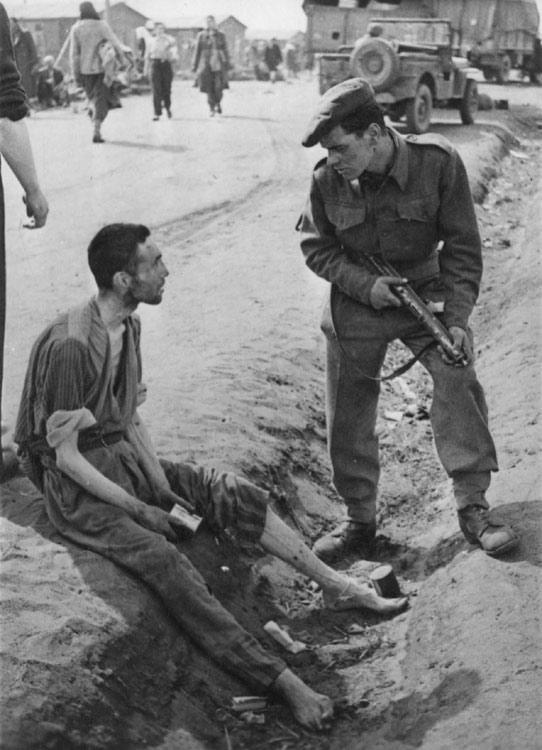From the testimony of Primo Levi:
“They were four young soldiers on horseback, who advanced along the road that marked the limits of the camp, cautiously holding their sten-guns. When they reached the barbed wire they stopped to look, exchanging a few timid words, and throwing strangely embarrassed glances at the sprawling bodies, and the battered huts and at us few still alive. To us they seemed wonderfully concrete and real, perched on their enormous horses, between the grey of the snow and the grey of the sky, immobile beneath the gusts of damp wind which threatened the thaw.”
(Primo Levi, If This Is a Man and The Truce, (Little, Brown Book Group, 1991), pp. 187-188.)
From the testimony of Zvi Katz:
"When we got up in the morning, the guards had disappeared.... A Red Cross car arrived from the nearby town and took us into the town. There were about 150-200 of us. We went quietly, frightened that things might still not be over... We reached the town and they put us in a large barn. I didn't want to be shut up and I went outside. I reached the town centre. Suddenly a convoy of tanks and armored vehicles drove up. There was a huge black soldier on an armored vehicle! They threw us packets of cigarettes. American soldiers surrounded me and pointed to the death's head symbol of the SS on their chests, and asked me if I'd seen any SS men...”
From the testimony of Zvi Katz:
“…I ran as fast as I could back to the barn. I burst in and shouted: "The Americans are here!" Nobody moved -- they all stared at me with an apathetic and unbelieving gaze. I shouted out my news again, and then some young men approached me and asked me not to start a panic. They began to interrogate me: What did they look like? Was I sure? And then I remembered and I took out the packet of Camel cigarettes from my pocket, and asked "What's this?" Wild jubilation broke out, and everyone ran outside [..]”
(Yad Vashem archives 03-4433, p. 27 (Hebrew))
In this photograph we see a survivor and an Allied soldier in a concentration camp, at the time of liberation. Many prisoners had been imprisoned for months and sometimes years before they were liberated, and had been cut off from life outside the fences. Notice the subtle gestures between the soldier and the survivor. The survivor is holding an object in his hands – apparently a pack of cigarettes. There appears to be a conversation between the two. In the two testimonies, the Allied soldiers seemed almost fantastic: Zvi Katz had to show the pack of cigarettes he had received from the soldiers for his friends to believe him, and Primo Levi describes them as “wonderfully concrete and real”. Why do you think he describes the soldiers that way?







